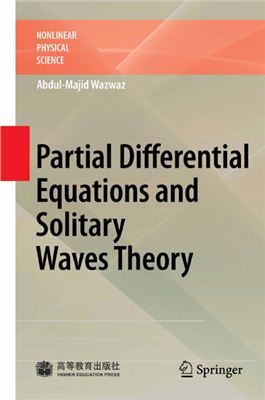Springer, 2009. - 700 pages.
"Partial Differential Equations and Solitary Waves Theory" is a self-contained book divided into two parts: Part I is a coherent survey bringing together newly developed methods for solving PDEs. While some traditional techniques are presented, this part does not require thorough understanding of abstract theories or compact concepts. Well-selected worked examples and exercises shall guide the reader through the text. Part II provides an extensive exposition of the solitary waves theory.
This part handles nonlinear evolution equations by methods such as Hirota?s bilinear method or the tanh-coth method. A self-contained treatment is presented to discuss complete integrability of a wide class of nonlinear equations. This part presents in an accessible manner a systematic presentation of solitons, multi-soliton solutions, kinks, peakons, cuspons, and compactons.
While the whole book can be used as a text for advanced undergraduate and graduate students in applied mathematics, physics and engineering, Part II will be most useful for graduate students and researchers in mathematics, engineering, and other related fields.
"Partial Differential Equations and Solitary Waves Theory" is a self-contained book divided into two parts: Part I is a coherent survey bringing together newly developed methods for solving PDEs. While some traditional techniques are presented, this part does not require thorough understanding of abstract theories or compact concepts. Well-selected worked examples and exercises shall guide the reader through the text. Part II provides an extensive exposition of the solitary waves theory.
This part handles nonlinear evolution equations by methods such as Hirota?s bilinear method or the tanh-coth method. A self-contained treatment is presented to discuss complete integrability of a wide class of nonlinear equations. This part presents in an accessible manner a systematic presentation of solitons, multi-soliton solutions, kinks, peakons, cuspons, and compactons.
While the whole book can be used as a text for advanced undergraduate and graduate students in applied mathematics, physics and engineering, Part II will be most useful for graduate students and researchers in mathematics, engineering, and other related fields.

